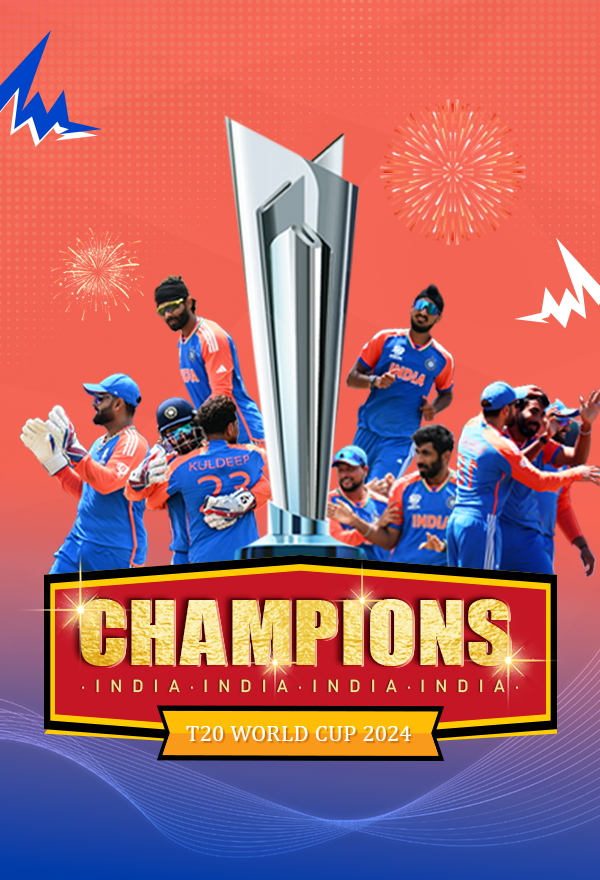
Priya Verma
theindiaprint|27-06-2024
Cricketing circles have been engulfed in heated discussions over two contentious subjects before of India’s match versus England in the second T20 World Cup semi-final: pre-seeding and pre-determined locations for the knockout games.

There has been much discussion over India’s allegedly unfair advantages throughout the World Cup, particularly in relation to match schedules, field conditions, and, of course, pre-seeding.
Actually, one of the most well-known people who have recently spoken out on the same issue is former England captain Michael Vaughan. He used X to elaborate on the unjust treatment of the Afghanistan squad after they were defeated by South Africa in the first semi-final in Trinidad and Tobago.
Vaughan launched an offensive, denouncing the partiality the Indian team had received from the Indian Cricket Association (ICC), including the decision to play their semi-final at a daytime venue.
As anticipated, criticism is flying in both directions from the internet community.
What, however, can we emphasize here? Let’s attempt to process the same, then.Amidst all the excitement, someone on Twitter took the time to lay out some historical norms and case studies for all of us to think about and debate.
Venues Set Ahead for Knockout Games
The main criticism that has surfaced recently has been directed on India’s selection of Guyana as the site for their match versus England.
Pre-seeding is something that has been a standard procedure for many years, despite the grievances that are expressed over the same.
As the tweet notes, there have actually been several occasions over the years of pre-determining venues: Australia was assured a semi-final venue in 1992; India was given Bengaluru as the site for the 1996 World Cup quarter-final; and in 2011, all three host countries—India, Sri Lanka, and Bangladesh—were given home advantage in knockout matches.
Therefore, although it is debatable why Guyana was chosen as the location this time around for India, a non-host country, this is where pre-seeding and the economic side of the game come into play.
Pre-Seeding and Known Hazards
Pre-seeding—the idea that a team’s path beyond the group stages is predetermined—has also become one of the most talked-about aspects of the World Cup.
This meant that, based on their ICC T20I rankings, the top two teams in each group of the 2024 T20 World Cup were given seeding.
Thus, India was A1 and Pakistan was A2 in Group A. England was B1, while Australia was B2 in Group B. Group C included of New Zealand (C1) and the West Indies (C2), while Group D included Sri Lanka (D1) and South Africa (D2). And most teams knew exactly who they would play in the knockout rounds, barring an upset by one of the top-seeded teams to secure their berth.
It is certain that the practice has destroyed the spirit of competition in the game; this World Cup has yet another unoriginal aspect.
The tweet further mentions that pre-seeding was followed in the T20 World Cups in 2014, 2016, 2021, and 2022.
Currently, the ICC has only really said that prioritizing the requirements of the visiting fans was a consideration in their decision to adopt pre-seeding.
Traveling fans may better organize their itinerary with the aid of the seedings. It would have been very difficult for supporters to arrange their journey to these places at such short notice since the Super 8 matches are all held on different Caribbean islands, which are separate nations.
But the issue that still has to be answered is: what about the previous editions when the competitions were held in a single nation? We’ll simply have to wait to find out the answers, I suppose.
The ICC’s Commercial Interests
Let’s go straight to the point: India is and will always be given preference since it attracts a large audience.
Cricket is seen as business-first, nasty and depressing, despite all that can be done to support and prioritize the game first.
It was only natural for the ICC to play their best cards to guarantee maximum viewership, given that they had already made the historic decision to co-host the tournament in the US, a country where the game is practically unknown, in an effort to promote the same.
This is the precise reason you have probably observed that the majority of Indian matches—if not all of them—occur during peak viewing hours, particularly around about 8 PM IST. All because the Indian market for the game is the largest it has ever been and the most profitable avenue for the ICC to generate revenue.
Unfortunately, profit—rather than the game’s true spirit—is what moves the game forward and always will. India is the most well-known player in the game; therefore, you can bet that, one way or another, the game will always favor them in some manner as long as they stay at the top.

Akash Deep’s determined half-century gives India the advantage

"It's Obviously Frustrating": Josh Tongue On Akash Deep's Blistering Half-Century

3 Teams That Could Target Jamie Overton At IPL 2026 Auction if CSK Release Him

From Dominica To The Oval: Yashasvi Jaiswal Achieves Unique Feat After 24 Test Matches







